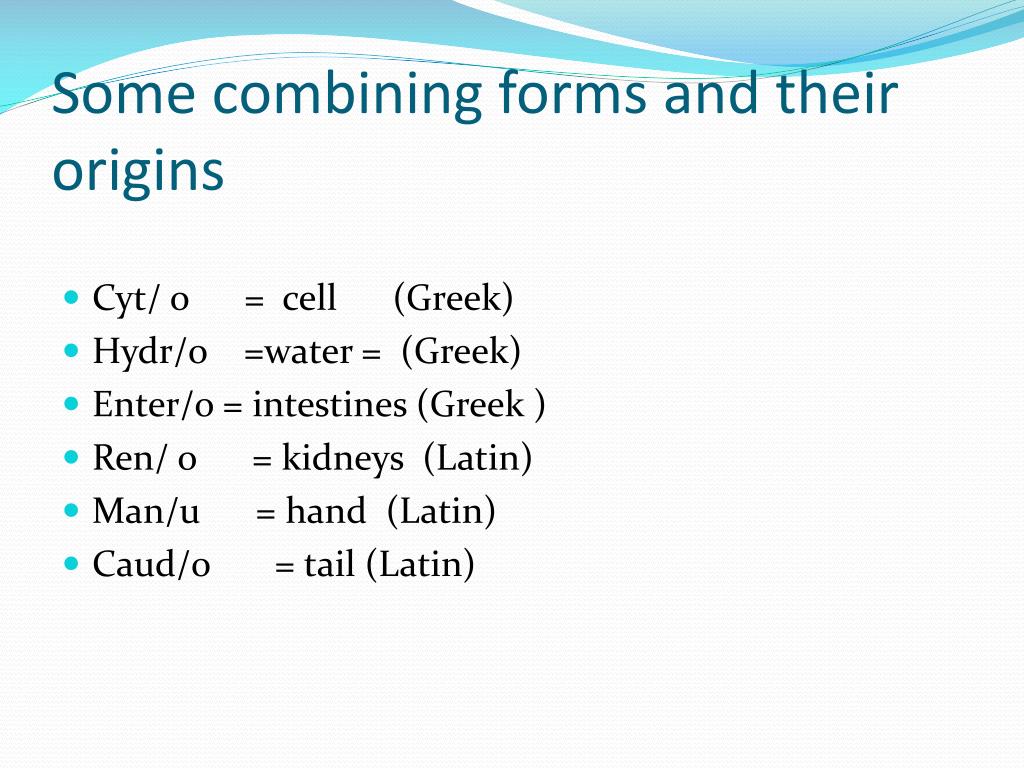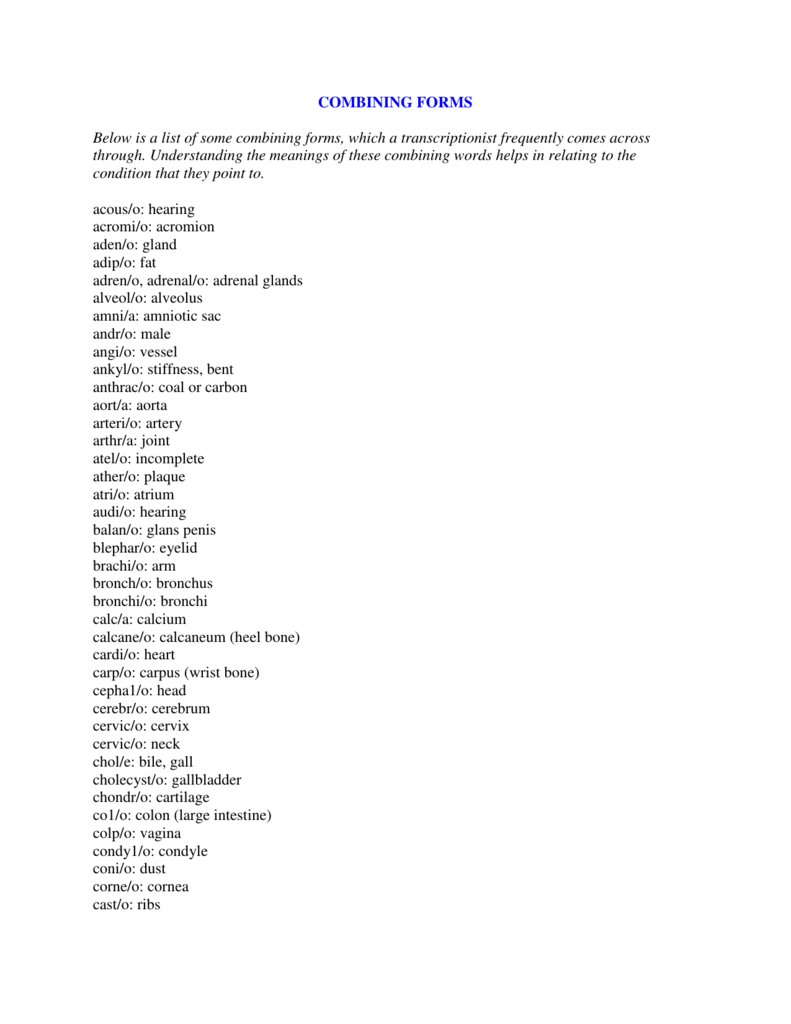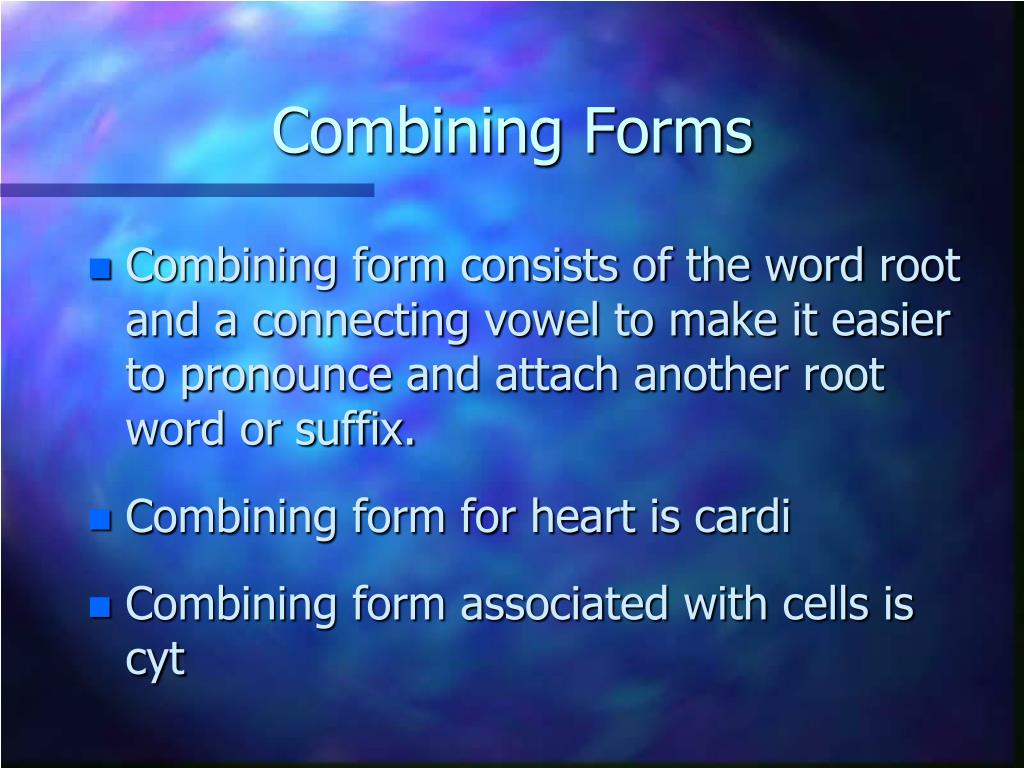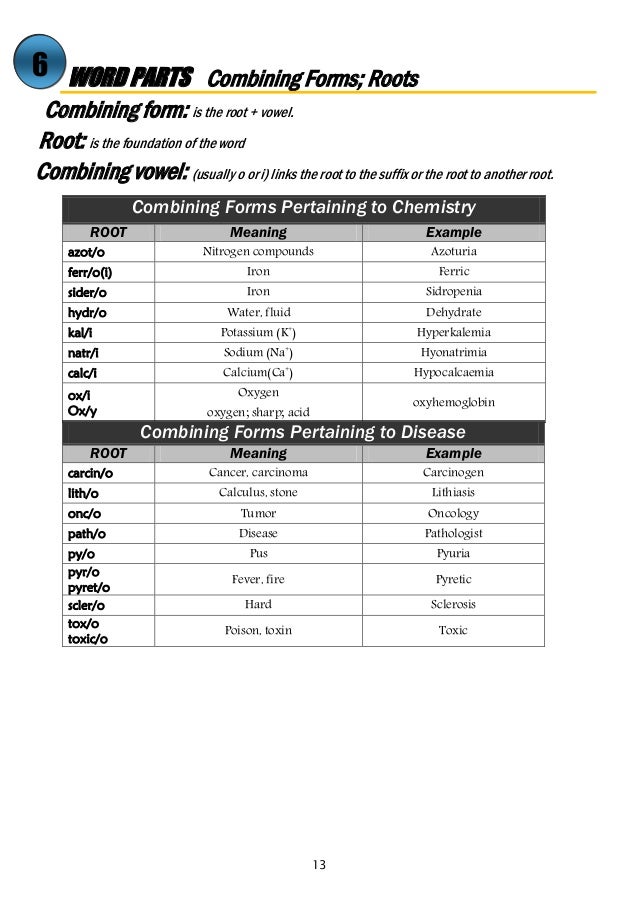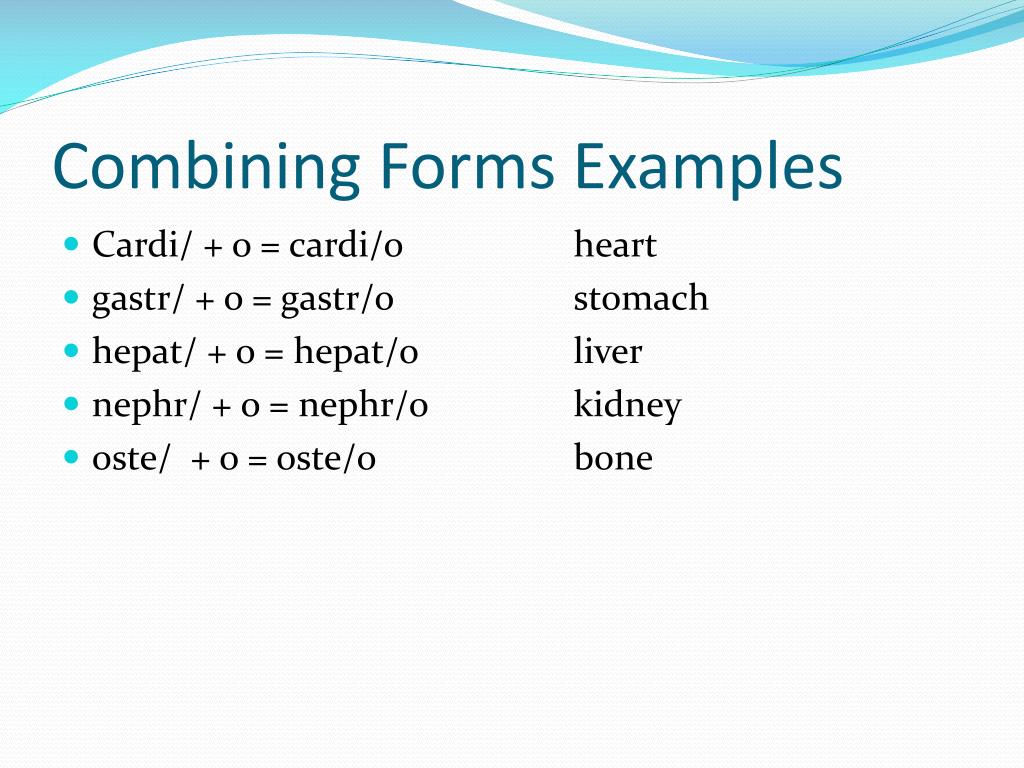Combining Form In Medical Terminology - The following tables go through some of the most common combining forms, their meaning, and an example of a medical term that uses the. A combining vowel is almost always an o, but in. Nearly all medical terms contain at least one root. The combining form is created when the word root is combined with a. A combining vowel has no meaning but connects roots to suffixes and roots to other roots. A vowel (usually the letter “o”) may be added to the root to aid in pronunciation. The word root contains the. When a word root is combined with a combining vowel, the word part is referred to as a combining form. A combining vowel is used when a root is followed by another word part that begins with a consonant. Most word roots are written with their combining form.
A combining vowel is almost always an o, but in. The following tables go through some of the most common combining forms, their meaning, and an example of a medical term that uses the. A combining vowel has no meaning but connects roots to suffixes and roots to other roots. 54 rows this is a list of roots, suffixes, and prefixes used in medical terminology, their meanings, and their etymologies. When a word root is combined with a combining vowel, the word part is referred to as a combining form. Nearly all medical terms contain at least one root. Most word roots are written with their combining form. The word root contains the. A combining vowel is used when a root is followed by another word part that begins with a consonant. A vowel (usually the letter “o”) may be added to the root to aid in pronunciation.
Nearly all medical terms contain at least one root. The following tables go through some of the most common combining forms, their meaning, and an example of a medical term that uses the. A vowel (usually the letter “o”) may be added to the root to aid in pronunciation. When a word root is combined with a combining vowel, the word part is referred to as a combining form. Most word roots are written with their combining form. A combining vowel is used when a root is followed by another word part that begins with a consonant. The combining form is created when the word root is combined with a. 54 rows this is a list of roots, suffixes, and prefixes used in medical terminology, their meanings, and their etymologies. A combining vowel has no meaning but connects roots to suffixes and roots to other roots. The word root contains the.
Combining Form
A vowel (usually the letter “o”) may be added to the root to aid in pronunciation. When a word root is combined with a combining vowel, the word part is referred to as a combining form. The word root contains the. 54 rows this is a list of roots, suffixes, and prefixes used in medical terminology, their meanings, and their.
Combining forms Medical Transcription
The following tables go through some of the most common combining forms, their meaning, and an example of a medical term that uses the. 54 rows this is a list of roots, suffixes, and prefixes used in medical terminology, their meanings, and their etymologies. When a word root is combined with a combining vowel, the word part is referred to.
SOLUTION Medical terminology combining forms suffixes prefixes
A combining vowel is used when a root is followed by another word part that begins with a consonant. The following tables go through some of the most common combining forms, their meaning, and an example of a medical term that uses the. When a word root is combined with a combining vowel, the word part is referred to as.
Medical Terminology Diagram Quizlet
A combining vowel is used when a root is followed by another word part that begins with a consonant. The following tables go through some of the most common combining forms, their meaning, and an example of a medical term that uses the. The combining form is created when the word root is combined with a. A combining vowel is.
PPT MEDICAL TERMINOLOGY PowerPoint Presentation, free download ID
A vowel (usually the letter “o”) may be added to the root to aid in pronunciation. A combining vowel is used when a root is followed by another word part that begins with a consonant. When a word root is combined with a combining vowel, the word part is referred to as a combining form. 54 rows this is a.
Medical forms
Nearly all medical terms contain at least one root. The word root contains the. A combining vowel is almost always an o, but in. A combining vowel has no meaning but connects roots to suffixes and roots to other roots. A combining vowel is used when a root is followed by another word part that begins with a consonant.
Medical forms
54 rows this is a list of roots, suffixes, and prefixes used in medical terminology, their meanings, and their etymologies. Nearly all medical terms contain at least one root. A combining vowel is used when a root is followed by another word part that begins with a consonant. A combining vowel has no meaning but connects roots to suffixes and.
Medical Terminology Chapter 2 Combining Forms PDF
When a word root is combined with a combining vowel, the word part is referred to as a combining form. Nearly all medical terms contain at least one root. The combining form is created when the word root is combined with a. Most word roots are written with their combining form. The word root contains the.
Medical Terminology Part 1; Prefixes, Suffixes, Combining Forms
Most word roots are written with their combining form. A vowel (usually the letter “o”) may be added to the root to aid in pronunciation. The word root contains the. Nearly all medical terms contain at least one root. A combining vowel has no meaning but connects roots to suffixes and roots to other roots.
PPT Medical Terminology PowerPoint Presentation, free download ID
A vowel (usually the letter “o”) may be added to the root to aid in pronunciation. A combining vowel is used when a root is followed by another word part that begins with a consonant. Nearly all medical terms contain at least one root. Most word roots are written with their combining form. A combining vowel has no meaning but.
A Vowel (Usually The Letter “O”) May Be Added To The Root To Aid In Pronunciation.
54 rows this is a list of roots, suffixes, and prefixes used in medical terminology, their meanings, and their etymologies. A combining vowel is almost always an o, but in. A combining vowel is used when a root is followed by another word part that begins with a consonant. Most word roots are written with their combining form.
When A Word Root Is Combined With A Combining Vowel, The Word Part Is Referred To As A Combining Form.
The word root contains the. Nearly all medical terms contain at least one root. The following tables go through some of the most common combining forms, their meaning, and an example of a medical term that uses the. A combining vowel has no meaning but connects roots to suffixes and roots to other roots.
